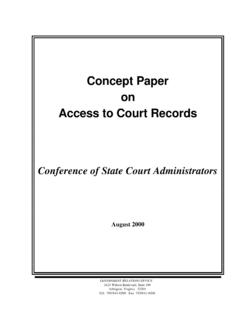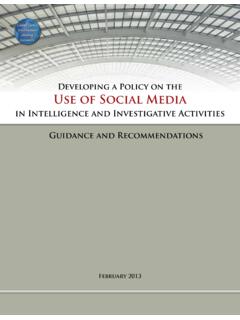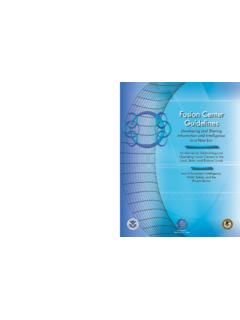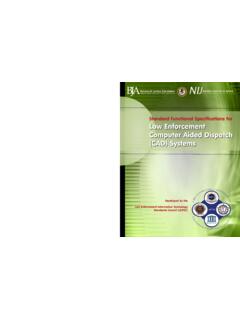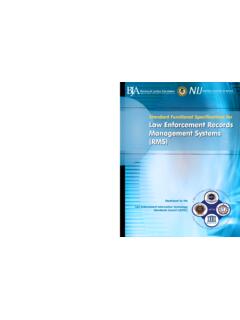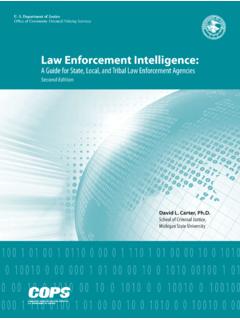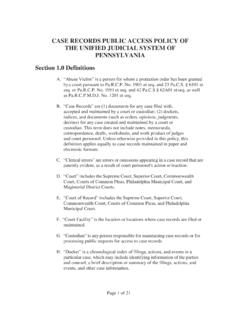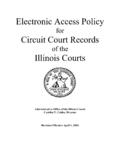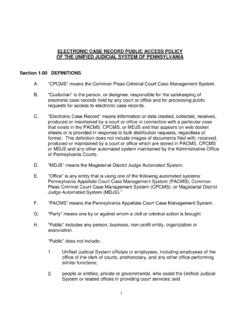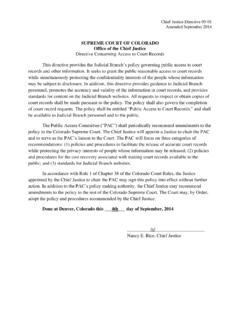Transcription of ACCESS TO ELECTRONIC COURT RECORDS An Outline of …
1 Gray Cary\EM\ 9999998-91014 ACCESS TO ELECTRONIC COURT RECORDS An Outline of Issues and Legal Analysis JAMES M. CHADWICK Gray Cary Ware & Freidenrich LLP 1755 Embarcadero Palo Alto, CA 94303 (650) 833-2000 Gray Cary\EM\ 9999998-91014 CONTENTS 1. Outline and Legal Analysis of Issues Involved in public ACCESS to ELECTRONIC COURT RECORDS 2. Comments of the Newspaper Association of America, et al., on the Federal Judicial Conference Proposal Regarding ELECTRONIC public ACCESS to COURT RECORDS 3. Comments of the Reporter s Committee for Freedom of the Press, et al.
2 , on the Federal Judicial Conference Proposal Regarding ELECTRONIC public ACCESS to COURT RECORDS 4. Comments of Investigative Reporters and Editors, Inc., on the Federal Judicial Conference Proposal Regarding ELECTRONIC public ACCESS to COURT RECORDS Gray Cary\EM\ 9999998-91014 -1- Gray Cary\EM\ 9999998-91014 Outline AND LEGAL ANALYSIS OF ISSUES INVOLVED IN public ACCESS TO ELECTRONIC COURT RECORDS I. INTRODUCTION. Recently, both the federal courts and the COURT systems of many states have begun to consider the adoption of, or have actually begun to implement, rules regarding public ACCESS to COURT RECORDS maintained in ELECTRONIC form.
3 For example, the California Judicial Council has recently promulgated proposed rules that would govern public ACCESS through ELECTRONIC means to trial COURT RECORDS maintained in ELECTRONIC form, and has invited public comments on those proposed rules. The federal Judicial Conference recently invited comments on less formalized proposals regarding ACCESS to ELECTRONIC COURT RECORDS . Many states are in the process of considering or adopting such rules. These proposals raise profound questions regarding public ACCESS to the judicial process.
4 They also implicate substantial privacy concerns. Therefore, it is vital that there be the most extensive possible public knowledge and understanding of these proposals and their implications. Such understanding is necessary to ensure that the public participates in the formation of rules regarding ACCESS to ELECTRONIC RECORDS in a meaningful manner. The following discussion focuses on federal and California law, but the issues and legal principles discussed are common to all proposals regarding ACCESS to ELECTRONIC COURT RECORDS .
5 II. SUMMARY OF KEY ISSUES RAISED BY public ACCESS TO ELECTRONIC COURT RECORDS . A. Key Issues Raised by public ACCESS to ELECTRONIC COURT RECORDS . The approaches proposed by various courts differ quite significantly. However, similar concerns are addressed by virtually all of the proposals, and each of the proposals implicates the fundamental right of public ACCESS to judicial proceedings and RECORDS . The California COURT Technology Advisory Committee (CATC) discussion of the rules being proposed in California summarizes the central concern expressed by most of the bodies considering such rules: The proposed rules on public ACCESS to trial COURT RECORDS in ELECTRONIC form attempt to balance the common law right of public ACCESS to trial COURT RECORDS against the constitutional right of privacy afforded by article I, section 1 of the California Constitution.
6 The rules recognize the fundamental difference between paper RECORDS that may be examined and copied only at the courthouse and RECORDS maintained in ELECTRONIC form that may be accessed and copied remotely. It is the conclusion of the COURT Technology Advisory Committee (CTAC) that unrestricted Internet ACCESS to case files -2- Gray Cary\EM\ 9999998-91014 would compromise privacy and, in some cases, could increase the risk of personal harm to litigants and others whose private information appears in case files. Thus, the approach taken by the CATC, and reflected in the proposed California rules, proceeds from two fundamental concerns: that there is a fundamental difference between permitting public ACCESS to COURT RECORDS located at courthouses and permitting remote ELECTRONIC ACCESS to COURT RECORDS ; and that there is a fundamental right to privacy that applies to information contained in COURT RECORDS , which must be weighed against the right of public ACCESS .
7 This and other concerns common to virtually all of the proposals present certain key issues: (1) Should rules governing ACCESS to COURT RECORDS maintained in ELECTRONIC form provide for remote ELECTRONIC ACCESS to COURT RECORDS ? (2) Does remote ELECTRONIC ACCESS to COURT RECORDS create risks of the impairment of privacy interests, identify theft, personal harm, or other dangers that are greater than those posed by public ACCESS to hardcopy COURT RECORDS ? (3) Should certain types of information that routinely appear in hardcopy COURT RECORDS that are currently subject to public ACCESS be sealed or redacted because of the risk of impairment to privacy interests raised by providing remote ELECTRONIC ACCESS to COURT RECORDS ?
8 (4) Should rules regulating ACCESS to ELECTRONIC COURT RECORDS ensure that restrictions on public ACCESS to such RECORDS are not imposed in a manner that would reduce the level of public ACCESS that currently exists? B. Key Principles Regarding ACCESS to ELECTRONIC COURT RECORDS . It is important to explicitly address the fundamental premises upon which such ACCESS should be based. I submit that the following principles are necessary assumptions of any rules governing ACCESS to ELECTRONIC COURT RECORDS : (1) The public and the press have a fundamental and constitutional right of ACCESS to COURT RECORDS in both civil and criminal proceedings.
9 (2) public ACCESS to COURT RECORDS serves many important interests, and should be encouraged and facilitated to the extent reasonably possible. Thus, remote ELECTRONIC ACCESS to COURT RECORDS should be provided to the broadest extent possible consistent with the preservation of legitimate privacy interests. (3) The protection of personal privacy is also an important value, and the public right of ACCESS to COURT RECORDS is not absolute. Certain private, personal information contained in COURT RECORDS need not be made public in order to promote the interests served by ACCESS to COURT RECORDS .
10 (4) As courts move to ELECTRONIC filing, rules governing ACCESS to ELECTRONIC COURT RECORDS will eventually become the rules governing ACCESS to all COURT RECORDS , -3- Gray Cary\EM\ 9999998-91014 and should not impose any restrictions on local ELECTRONIC ( courthouse) ACCESS to COURT RECORDS that are inconsistent with the current law regarding public ACCESS to COURT RECORDS . (5) Rules governing ACCESS to ELECTRONIC RECORDS should anticipate the need to keep certain information confidential, and should require that ELECTRONIC record -keeping systems employed by the courts are designed to provide for the segregation of confidential information.
